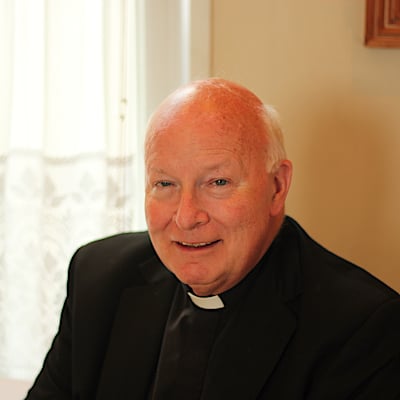#When Jesus reached the territory of the Gadarenes, two demoniacs came towards him out of the tombs—they were so dangerously violent that nobody could use that path. Suddenly they shouted, “What do you want with us, Son of God? Have you come to torture us before the time?” Now some distance away there was a large herd of pigs feeding, and the devils pleaded with Jesus, “If you drive us out, send us into the herd of pigs.” And he said to them, “Go, then,” and they came out and made for the pigs; and at that the whole herd charged down the cliff into the lake and perished in the water. The herdsmen ran off and made for the city, where they told the whole story, including what had happened to the demoniacs. Suddenly the whole city set out to meet Jesus; and as soon as they saw him they implored him to leave their neighbourhood (Mt 8:28-34).
We were looking at the strangeness of evil yesterday, its illogic and its inexplicability. I’d like to consider another element in this story today: the pandemonium. All the major players in this scene except Jesus are doing a lot of running around: the pigs are dashing over the edge of the cliff; the pig-herders are dashing back to town to tell their experience to everyone they see, and then the townspeople are soon dashing back to Jesus, and not to thank him but to plead with him to go away. Mass-hysteria seems to be the word for it. Jesus, however, is stillness incarnate, the quiet eye of the storm. But, no matter how still, how masterful Jesus has been, he has not won over the Gadarenes. They are running scared and want nothing to do with Jesus. The Gadarenes seem to be just as frightened by Jesus now as they had been by the demoniacs before.
And another strange thing: the account in the gospel of Matthew does not suggest that the townspeople and the pig-farmers may have been upset by the loss of income that the pigs’ bizarre death represented. I doubt that this was an accidental omission on Matthew’s part. I think, in fact, that Matthew is telling us that financial considerations were not uppermost in the Gadarenes’ minds. The real issue for them seems to be much deeper. I believe they saw rightly that the conflict that took place between the demoniacs and Jesus was no ordinary conflict, but one of genuinely epic proportions. It seems to have been experienced by the townspeople for what it was: a supernatural conflict between Good and Evil.
I begin to reflect that the people of the Gadara region were pagans and had very little, if any, religious background to help them understand their experience. So they were way out of their depth and could not integrate any of it. They genuinely needed, it seems to me, to place some distance between themselves and this man Jesus, who they knew was the catalyst of this show-down between the primordial Light and Darkness.
I suggest, too, that Jesus understood their problem, because when the Gadarenes ask him to leave, Jesus leaves, no questions asked. He doesn’t reproach them as he sometimes reproaches the Jews for their lack of faith. Maybe, with time, the Gadarenes would come to understand what had happened on that God-forsaken road next to the tombs. But now, they could not cope with it. Jesus respects their need and in no manner does he force himself upon them. Once again: he honours human freedom.
As I draw these reflections to an end, I become aware that this passage is still not an easy one for me. I do not feel that I’ve grown in warmth toward Jesus as I’ve pondered the story. Jesus seems a difficult Jesus in this passage, a deeply serious Jesus, very focused on handling the demoniacs, very intense, quiet and rooted in the Truth. I then realise that Jesus simply isn’t easy to understand, and if I expect him to be so, it’s time to adjust my expectations. Jesus is the Son of God. There is a divine ‘strangeness’ about him as he confronts evil, quietly subdues it by the power of very Truth, and resolutely refuses even to negotiate with evil, to give it any air, or allow it in any manner to prevail.
I see how masterful Jesus is in the supernatural world that revealed itself in the demoniacs. It was a situation that was so evil that no other human being had been able to manage it. I renew my trust in him.
Also, I see how he handles this situation at the deepest possible level. No bandaid-therapy, this. I reflect that he always does that when I pray to him for help. He always answers my prayer, but at a depth that I may not have been ready for and that may not seem at first to improve the situation. I think of the Gadarene townspeople. They have been helped by Jesus, but they are not ready for the depth of help Jesus has given them and they send him away. I suddenly realise that if I were to send Jesus away, he would respect my request and leave immediately, no questions asked. I pray that I am never so senseless as to do any such thing.
I need to integrate this into my relationship with the Lord. But, like the Twelve, who lie doggo for a little while, I too, should be silent and observe closely the way Jesus deals with events that are far beyond my understanding. Jesus is Lord. That much is completely clear.
Rushing about at St Pancras, London.











